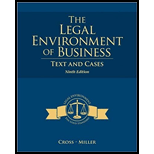
Case summary:The government of H entered into a contract with an arms dealer known as R to buy weapons for over the six-year period. When the government was replaced in H then the government decided to reduce military size which resulted in deterioration of the relationship with R. The government H refused to honor the contract by purchasing more arms and paying lesser amounts for the same. R filed a case in the federal district court of the US to recover the damages caused.
To discuss: The preclusion of this lawsuit by the Foreign Sovereign Immunities Act.
Explanation of Solution
Foreign Sovereign Immunities Act is a judicial practice and it means that if any defendant who belongs to any foreign country or is eligible to belong from a foreign state under the act of FSAI then that person is immune to any legal actions or proceedings in any court which is situated in the US (both federal and state) unless there is an applicable exception for that immunity.
One of the exceptions of FSAI is that when a foreign state engages itself in commercial activity within or outside of the US and has an effect on the US, which is direct in nature then, in this case, the foreign state will not be immune. In accordance with this exception, the US state is getting affected directly by this commercial activity and so the government of H will not be free from the FSAI lawsuit.
Want to see more full solutions like this?
Chapter 11 Solutions
The Legal Environment of Business: Text and Cases
 Foundations of Business (MindTap Course List)MarketingISBN:9781337386920Author:William M. Pride, Robert J. Hughes, Jack R. KapoorPublisher:Cengage Learning
Foundations of Business (MindTap Course List)MarketingISBN:9781337386920Author:William M. Pride, Robert J. Hughes, Jack R. KapoorPublisher:Cengage Learning Foundations of Business - Standalone book (MindTa...MarketingISBN:9781285193946Author:William M. Pride, Robert J. Hughes, Jack R. KapoorPublisher:Cengage Learning
Foundations of Business - Standalone book (MindTa...MarketingISBN:9781285193946Author:William M. Pride, Robert J. Hughes, Jack R. KapoorPublisher:Cengage Learning

